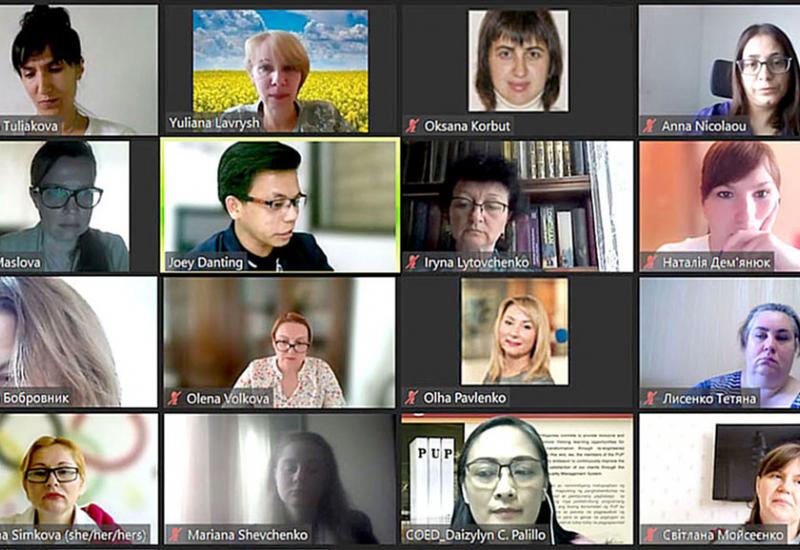Departments of English for Engineering No. 1, No. 2 and the department of English for Humanities of the Faculty of Linguistics organized and conducted the international forum "Sustaining the Quality of Teaching under Conditions of Martial Law: Global Initiatives for the Professional Development of Educators." It took place on June 14 in an online format.
The event was attended by teachers and scientists of the Cyprus University of Technology (Ph.D. Anna Nicolaou, report "Virtual Exchanges in the midst of a Crisis"), Aristotle University of Thessaloniki, Greece (Ph.D. Maria Perifanou, report "Open Educational Resources in Time of Trials"), Polytechnic University of the Philippines (Professor J. Denting and Doctor of Philosophy D. Palillo, report "Peculiarities of a Teacher's Work under Recessionary Conditions"), University of Valencia, Spain, and Federal University of Espirito Santo, Brazil (A.S. Pavon and Kyria Finardi, report "Emergency Distance Education During the Quarantine: Tools, Challenges, Lessons Learned"), Norwich Institute for Language Education, UK (Thom Kiddle and Carole Anne Robinson, report "Online Resources for Learning English of Professional Orientation"), and others.
The participants and guests of the forum exchanged views and expressed suggestions on ensuring the quality of teaching foreign languages under martial law and the peculiarities of teaching foreign languages under conditions of blended learning. The experts offered a set of practical online tools and resources for teachers, shared the acquired experience of integrating digital educational technologies into the educational process, licensing open access resources of their own, and the prospects of virtual intercultural student exchanges. A separate issue was devoted to the peculiarities of accreditation of educational programs under martial law.
One of the key speakers was the head of the Foreign Pedagogical Systems and Adult Education Department of Ivan Zyazyun Institute of Pedagogical and Adult Education of the National Academy of Educational Sciences of Ukraine, a member of the National Agency for Higher Education Quality Assurance, Professor Natalia Avshenyuk, who delivered a report "Higher Education Quality Assurance under the Conditions of Martial Law in Ukraine''. Her primary focus was on issues of providing high-quality educational services in the war conditions and the need to train highly qualified specialists for the revival and reconstruction of our country in the post-war period. In addition, she spoke about the consolidating and strategic role of the National Agency for Higher Education Quality Assurance in strengthening Ukraine's position in the international educational space; characterized the main directions of the work of the Agency under the current conditions (they consist, among other things, in providing of consultative assistance to the higher education institutions in matters of accreditation of educational programs for training students and conferring the degree of Doctor of Philosophy); outlined the strategic initiatives of NAQA regarding the development of the system of external higher education quality assurance in Ukraine, reflected in the National Action Plan on Ukrainian external higher education quality assurance for 2022-2023 period, which was presented on May 26, 2022 at the International Online Forum "Higher Education Quality Assurance in the Wartime''.
In the debate, the participants highlighted the importance of justified on grounds of methodology integration of digital educational technologies, providing a differentiated approach to learning taking into account the emotional and psychological state of students, and the need to develop flexible educational programs with the possibility of implementing multimodal strategies for teaching foreign languages.
In the end, teachers and experts adopted a resolution summarizing their main proposals for ensuring high-quality teaching of foreign languages:
- to develop partnerships and international cooperation on matters of integration of digital educational technologies in the educational process;
- apply the main principles and strategies of the Pedagogy of Partnership in teaching foreign languages in order to ensure individualization of education;
- to organize academic virtual student exchanges with the aim of promoting the development of intercultural competence and communication;
- to spread the philosophy of Open Education Science without restrictions.

